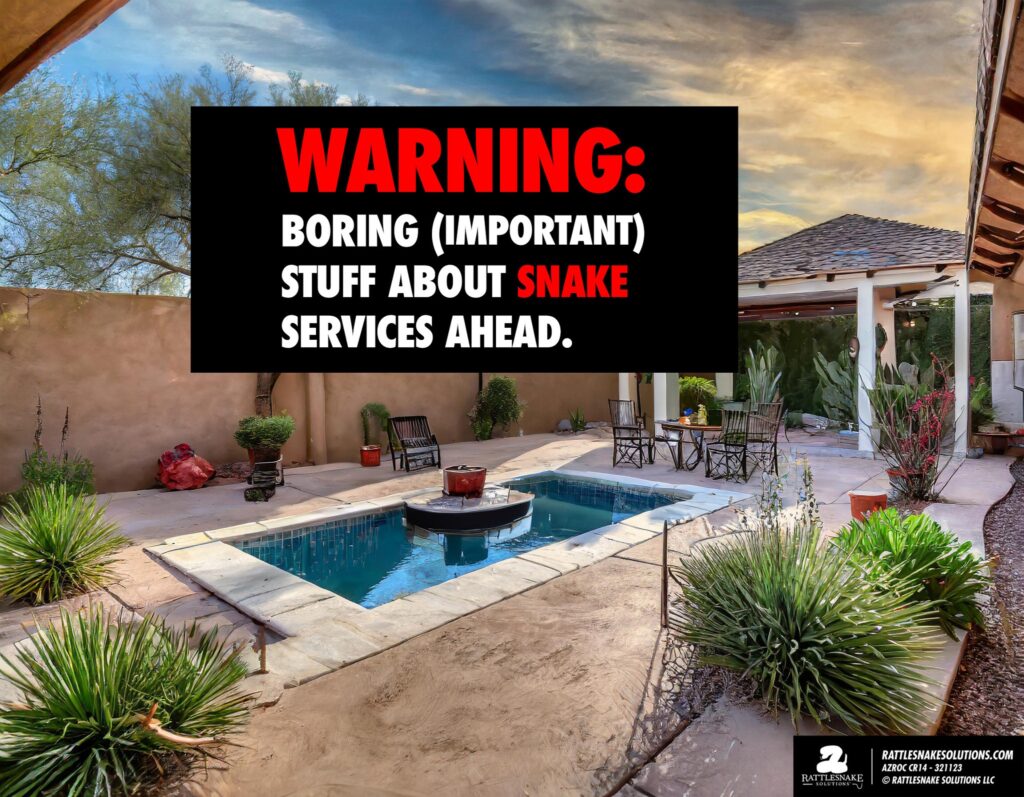
This post isn’t exciting, but it is necessary. We are so happy that the tides seem to be changing on the topic of rattlesnakes. The old ways of killing them are being replaced with smarter practices. Short-distance relocation and prevention, like snake fence installation and habitat reduction, are becoming the norm. Not only are these practices better for the environment, but they are more effective in avoiding encounters than the old ways.
But, that comes with it’s own troubles. More people than ever are offering their services to the public to relocate snakes and install snake fencing … but are they doing it right? Is the service even legal? More often than not, unfortunately, multiple laws are often broken by well-meaning individuals. It’s wonderful that this goodwill exists out there, but now comes the more complicated second half of the task: making sure that providers are acting responsibly. As a homeowner, the laws of snake relocation and prevention are important to understand. So get a coffee and get ready, because this will not be exciting.
Snake Relocation in Arizona REQUIRES a Wildlife Services License
Snake Relocation services offered to the community requires a Wildlife Services License from the Arizona Game and Fish Department! Private certifications and training do not allow legal offering of these services to the community, and should not be confused with legal permits to perform these tasks. Removal and relocation of a rattlesnake is a complex matter, which is not as simple as simply putting a snake in a bucket and taking it to another location – that’s where the real work begins.
EVERY snake relocation person needs their own license
Any entity or business offering snake removal services must have EVERY member of the team be granted individual Wildlife Services Licenses. If one member of the team has a license but others are performing relocation services without it, this is against the law. If you live in a community where the security guards offer snake removal services, it is most likely against the law.
Snake Fence Installation often requires licensing from the state
Snake Fence installation requires a contractor’s license in most situations. AZROC licensing and insurance protect your property. If the total cost, including labor and materials of your project, is above $1,000, make sure the company is licensed, bonded, and insured with AZROC. You can check here: (https://roc.az.gov/search).
For your protection as a homeowner, and many other reasons: work with licensed contractors. It might seem great to save a few bucks up front, but when the installer ghosts you or messes up an expensive gate, you’ll be left without recourse.
Insurance! Don’t let someone on your property to catch a venomous snake who can hold you liable.
Rattlesnake bites are expensive! So are your walls and gates. The guy down the street who wants to help with a snake seems great, but what happens if his internet Steve Irwin act doesn’t work out? A rattlesnake bite is expensive, and you don’t want to learn this the hard way by being held liable.
What kind of insurance should be carried by ANY individual visiting a property to capture a venomous snake?
General Liability and Workers Compensation at minimum. As a property owner, I’d be cautious about inviting anyone to my place to catch a venomous snake that could hold me liable if they are bitten in the process.
Love it or hate it, the HOA has its say in your snake fence.
HOAs and private communities usually have very specific rules about snake fencing. Some of these rules can be complicated to work through or have requirements that would make any snake fence installation ineffective. If you have an HOA, it’s advisable that you inquire about these rules BEFORE getting any contractor involved. Unfortunately, we are often in the position of having to remove/fix snake fencing installed by landscapers and companies who circumvent these rules, and the homeowners end up with a mess.
Any changes to drainage can cause big problems if not properly assessed. In some parts of the county, drainage and flood aversion may be subject to special consideration. Check in advance!
Wait, is this just a way to get people to call you instead?
It might seem like that, but our real interest lies elsewhere: making sure that the snakes survive and that homeowners are protected … not only from rattlesnakes but the shady business practices that often feed on fear. There are many businesses that offer these services ethically and legally to choose from, so this article in no way singles out Rattlesnake Solutions as the only choice. Think of it this way: making sure to go through the proper legal channels, licensing requirements, and insurance coverage ensures that the business you hire has been scrutinized by regulatory entities and is a verified professional service. Kind of like “you must be this tall to ride this ride”, someone you call to catch a venomous snake in your garage should be able to meet certain requirements to be considered a viable service easily.
This is not as fun as our usual posts, but as a homeowner, I’d want to know these things about any contractor coming to work at my place. Snake-related services are kind of niche, so many aren’t aware of them. But now you are. Just remember, the same as anything else: if a price seems too good to be true, it’s likely some shortcuts are being taken.
